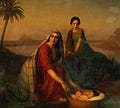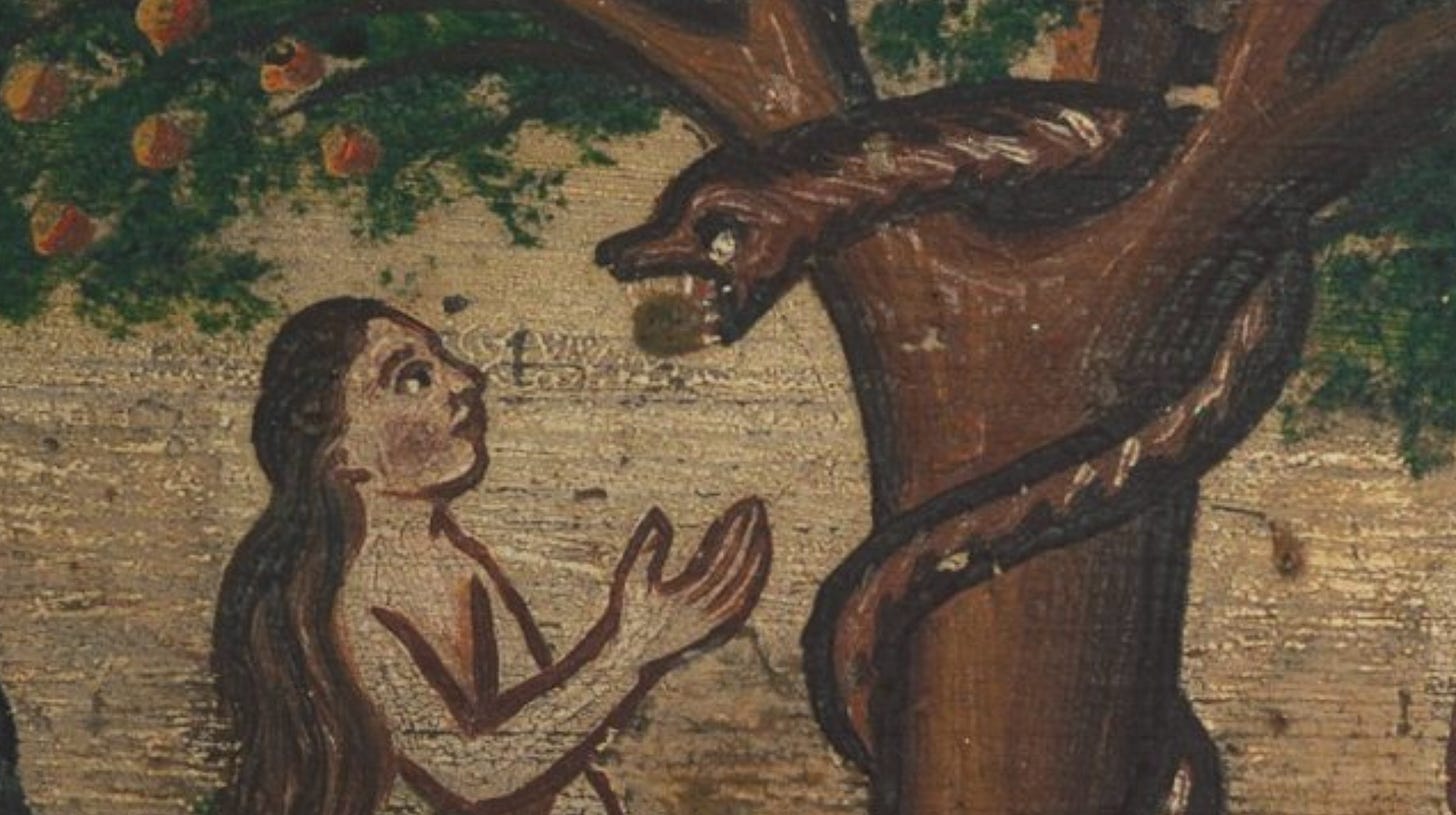Vacation Bible School’s fifth episode, on Young Moses vs. the Pharaoh, is up. Emily and I talked about the Prince of Egypt movie, the much-cooler stories behind the stories of Jethro and the plagues, Moses’ long arc as a character, and so forth.
And now, let’s discuss one more thing about this part of Exodus: Moses’ family was not the first family in the Bible to rebel.
Hot take: Original sin is a bad guess.
Eve didn’t doom us.
Eve was willing to doom herself for the rest of us, though.
When she ignored God’s over-the-top warning (He said she would die on the day she ate the fruit, but that didn’t happen) and considered the snake’s argument (a partial truth, that Eve’s death would be less certain than God made it out to be, and a whole truth, that the tree would reveal advanced knowledge), she commandeered the power of procreation from God. We know this based on the poetry, that the fruit suddenly taught her about her own flesh, and also from the specifics of the curse: the pains of childbirth, as if that was ever going to be pain-free.
Eve stole the blueprint to her own body and smuggled everything out of Eden. The stakes were simple: either pull off the biggest caper of all time or risk the extinction of the species, if God were to find giraffes or mollusks or some new creation more interesting than He found humans.
And why shouldn’t she have? God made no moral argument against knowledge. Read Genesis. God expressed little interest in morality for a really long time. For all we know, He was only hanging onto the Blessing until Eve or Adam (yeah right) found the gumption to take it. We don’t have to feel bad about it. The Fall from Eden was a divorce settlement — she keeps the kids, He keeps the house, and everyone can remain amicable.
For this, Eve was cursed with … the ability to use the power she stole. And if Eve was cursed by Heaven for stealing the secrets of survival, then Eve was Prometheus.
Right then, Aloof Universesmith God and Uncle Garden Detective God and the secret angel council and the fine-print-reading snake and the deleted sea monster and all the other aspects of the same Big Guy had to know they were no longer dealing with a pushover like Adam. The extra craft God put into the creation of woman had backfired. God’s final creation was a worthy adversary.
Besides, she was already mortal all along, God later admits (Genesis 3:22). And there’s little indication any kind of afterlife existed at the time. So Eve got away with it clean, other than having to listen to Adam gripe about getting a job.
Upon using the power, she remembered to credit God, saying, “I have produced a man with the help of the Lord.”
And eventually, God saw that it was good, somewhat. He’d tell Noah to use those procreation powers — the ones He might’ve planned to reserve for Himself indefinitely, the ones hijacked by Eve — to populate a planet, to rebuild, to defy the grave, and to turn the present into a future.
When Eve took matters into her own hands and seized the means of reproduction, what she stole for us was hope.
But hope requires many hands, one after the other.
If we make it, we'll take the next chance.
After the Flood, when God was low on support and needed to recruit Abraham, He promised Abraham children. Who literally bore the burden of that hope? Hagar and Sarah, women pitted against each other by the pressure of fulfilling prophecy.
When passive Isaac was showing little urgency in keeping hope alive, who stormed into his life? Rebecca, a whirlwind of active verbs from her first scene onward, including as she orchestrated three men — Isaac, Jacob, and Esau — until hope arrived in the hands she thought had the best chance of preserving it.
When we realize Jacob ultimately needed all 12 sons — because son #11 Joseph might not’ve agreed to save the family if not for #4 Judah’s protection of #12 Benjamin — we realize the differing kinds of resilience by Leah and Rachel were both critical all along.
We'll take the next chance. And the next.
Then, if not for a forgotten, double-widowed girl named Tamar using all the tricks she’d learned from watching Jacob and Rachel, the hope that officially passed to Judah might’ve ended before it got to King David, long before it got to Jesus.
Egypt presented the longest odds of all. The nation was enslaved. Four-hundred years without hope. The pharaoh was a demigod backed by a pantheon, a walking weapon. He thought himself invincible.
And then an enslaved girl named Miriam crept along the edge of the Nile, after her mother had placed a basket of hope in the river. Breaking the law, defying a demigod, and risking her life, Miriam kept creeping until she’d snuck an adorable little saboteur right under the emperor’s nose. It’s possible she went even further, once she and her mother became Moses’ nannies, using their position in a demigod’s house to nudge Toddler Moses toward the heresy of hope.
Soon, another woman named Zipporah displayed the quickest thinking in the entire Bible, more or less tricking the Almighty into thinking Moses was circumcised, or whatever the hell you wanna say is going on in Exodus 4:24.
Moses — the desert boy, the hesitant insurgent — could only crumble an empire because the women in his life did what Eve, Rebecca, and Tamar did: they rebelled in the name of hope.
Hope is an act of defiance.
On and on until we win, or the chances are spent.
Alexey Tyranov
Support for all of this business, for the time being, can happen at SinfulSeven.com, where Spencer Hall, Alex Kirshner, Richard Johnson, Tyson Whiting, and I are making a Weird Western/college sports ebook for publish August 1, available for now (and not much longer) at a price of $0.99+, with 20% going to Feeding America.
You can also follow VBS on Twitter and our newly posted Instagram.
Also! Emily and I are talking about launching a VBS Patreon. The show itself will remain free and accessible for all, seeing as we are not the Council of Toulouse. But we might wanna include some hopefully worthwhile ideas like stickers, mugs, book-club chats, show notes, and maybe some other fun merches. Ideas welcome! We are also welcoming ideas on T-shirts!





In for all the VBS Patreon!
Patreon would be fun. Maybe those episodes go more into the non-canon (apocryphal) stuff?